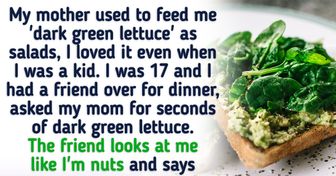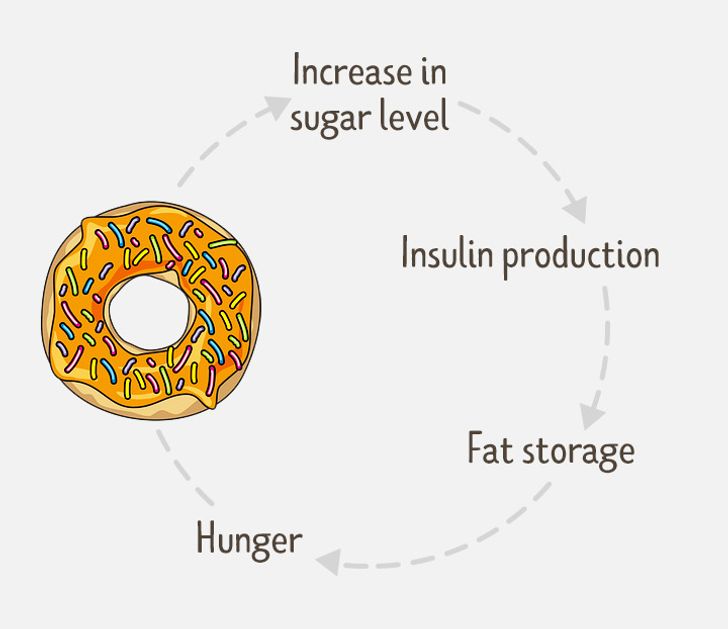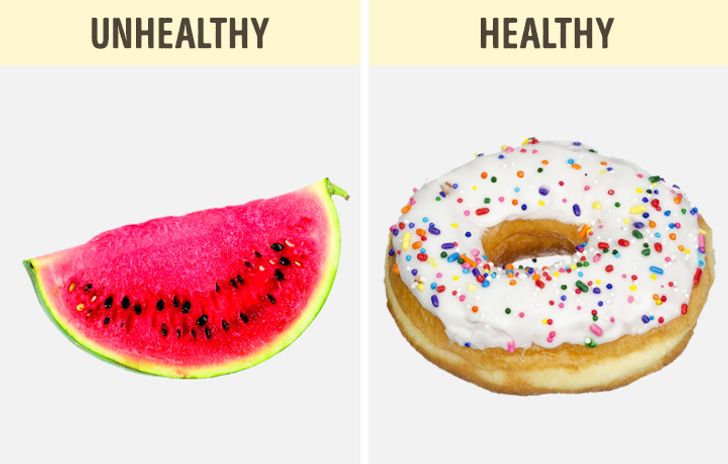I agree everybody is different. We can't expect that food affects us the same way as others. Right?
Scientists Have Proven That There Is No Such Thing As Healthy Food
When trying to lose weight, it’s better to base your decisions on scientific facts, not trendy diets. We want to tell you about a huge study conducted by Israeli scientists who found that there are no universal principles for healthy diets, and for some people, tomatoes might be more harmful than ice cream. Eran Elinav and Eran Segal from the Weizmann Institute of Science processed the information of about 800 volunteers from age 18 to 70. The participants of the study used a special app to inform the researchers about their lifestyle and each of them had glucose meters on them to constantly track the level of sugar in their blood. And the results amazed the entire world.
Bright Side shares several facts with you that will help you understand which foods you should eat in order not to gain weight and stay healthy.
1. The reaction of the body to food depends on the body, not on the food.
It turns out that some people’s bodies react to unusual foods with an increase in sugar levels. For example, sushi, which looks completely harmless, gives a sugar boost that is equal to eating ice cream. And watermelon causes a bigger spike in blood sugar than chocolate. One of the participants of the experiment said that she had been trying to lose weight for many years. She tried different diets until she realized that the reason for her high sugar levels was her favorite tomatoes.
In other words, different people can have completely different reactions to the same foods, and this can depend on several factors:
- The individual’s microbiome is a set of 100 trillion microbes that live inside the body. Different people have different microbiomes and they influence our response to food.
- Physical activity requires energy that usually comes into the muscles as sugar from the liver. People who are more physically active have cells that are more susceptible to glucose, so their sugar level is usually lower than that of people who have a sedentary lifestyle.
- Stress can make our body produce adrenaline and cortisol, which stimulate the increase of sugar levels in the blood.
2. A high glucose level stimulates the body to store fat and causes hunger.
When we eat foods that are not good for us, the level of sugar in our blood increases which makes the pancreas produce more insulin. The cells react to that, conserve glucose in the form of glycogen and fat which leads to both a quick drop of sugar levels in blood and hunger. And what do we do? We eat, which starts the vicious cycle of “storing fat and hunger” which eventually results in weight gain.
Here are the most popular signs of high sugar levels:
- feeling hungry often;
- feeling thirsty;
- dry mouth;
- getting tired quickly;
- frequent urination, even at night;
- stomach problems;
- delayed healing.
3. Eating foods that cause a quick rise in glucose levels leads to the development of diabetes and cardiovascular diseases.
According to the World Health Organization, there is an epidemic of diabetes in the modern world — a disease caused by problems with insulin production. The number of cardiovascular diseases is increasing, especially the ones that are connected with hyperglycemia (high sugar levels). These diseases are one of the main reasons for death in the world. This research also proved that general recommendations on healthy diets can be ineffective for an individual. This is why knowing which foods are good for you and which ones aren’t can be a reliable way of controlling sugar levels in order to prevent these diseases.
How do you know what food you need?
Here is what the scientists recommend:
- Choose foods that don’t cause a sudden spike in sugar levels.
- Buy a glucose meter and check your sugar levels before and after eating. This will allow you to understand how your body reacts to different foods.
- Limit your portions. The increase in sugar levels can be caused not by the food itself but by the amount.
- Drink more water during eating: it decreases the sugar levels.
- Experiment with carbohydrates: for example, instead of sugar or honey, try adding raisins to your oatmeal, and substitute pasta and rice with beans.
- Don’t use artificial sweeteners because they cause sugar spikes in most people.
- Don’t buy fat-free dairy products and don’t be scared of fatty foods: cheese, butter, and eggs actually help decrease sugar levels in the blood.
- Consult a nutritionist who will tell you about the individual features of your body and help you create a diet plan.
A video outlining the research:
Here is Eran Segal’s TED Talk.
The Israeli scientists continue their research and are gathering new volunteers in Israel to take part in it. You can join it here.
Which food principles do you believe in? Tell us in the comment section below!
Comments
Wow! That is so awesome!
But our body does give signs that tell us that we need to see a doctor and go for a health checkup. Here are the signs---
https://www.medylife.com/blog/health/10-warning-signs-you-need-to-go-for-a-health-checkup-now/
Related Reads
My Stepdaughter Must Only Eat Vegan — My House, My Rules

My Brother Excluded My Son Out of His Child-Free Wedding but Invited His Little Cousins

My Step Daughter Is a Crazy Hormonal Teen, and She Saved My and My Baby’s Lives

I Accidentally Overheard My Fiancé and His Mom’s Vicious Plan Against Me

My MIL Hates Me, and Her Humiliating Comment Was the Last Straw

12 People Who Came Across the Most Disturbing Discoveries

My Ex Was Wasting Our Son’s College Money on His Stepdaughter

People Share 20+ Basic Facts They Didn’t Learn About Until Adulthood

16 Stepparents Who Proved They Can Be Real Parents to Their Stepchildren

10 Times Good Intentions Became Embarrassing Memories That Still Haunt People

I Refuse to Let My Daughter, 12, Share a Room With Her Stepbrother, 14

“Fillers Ruined Him,” Ryan Gosling’s Latest Appearance Leaves Fans Shocked



